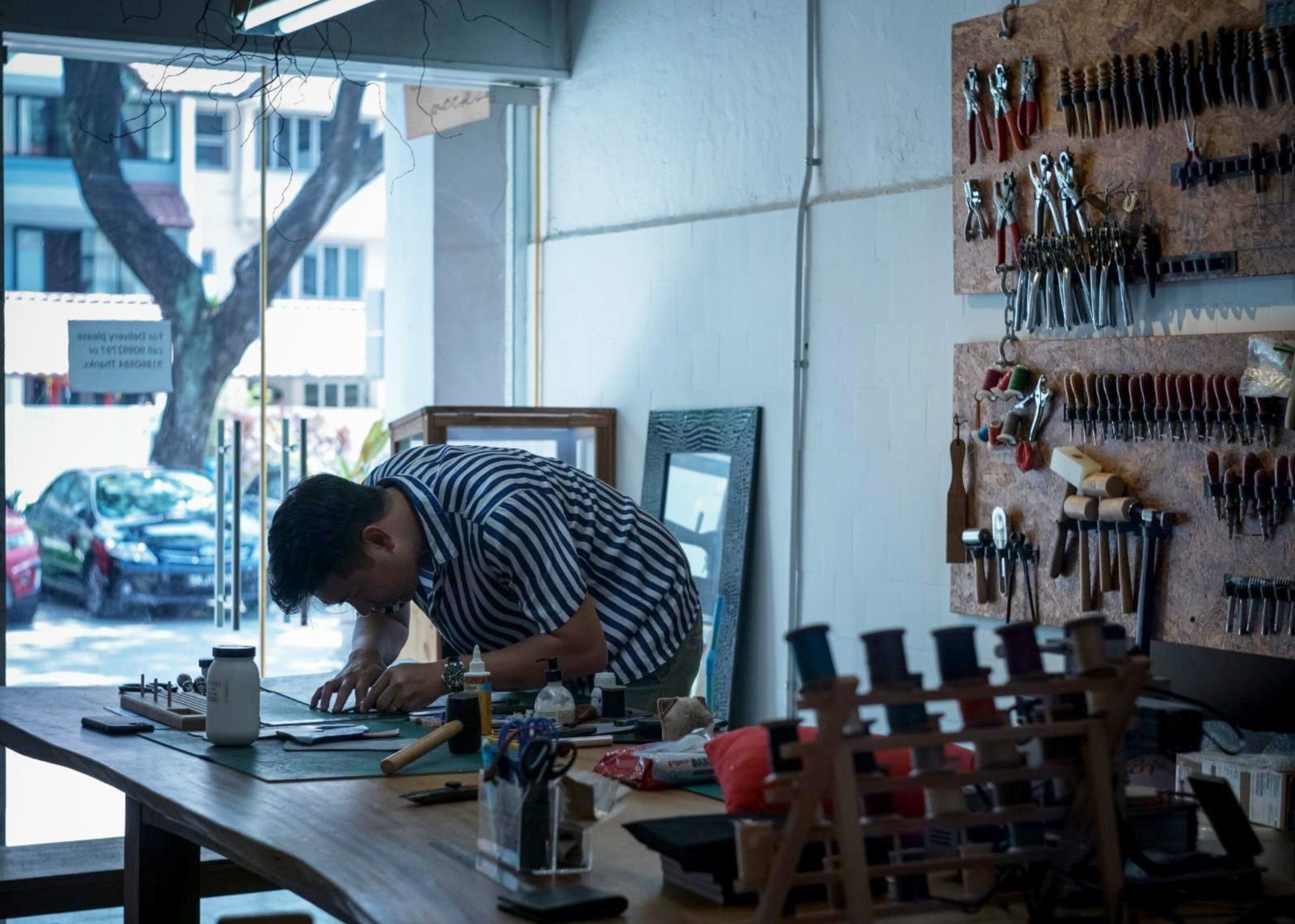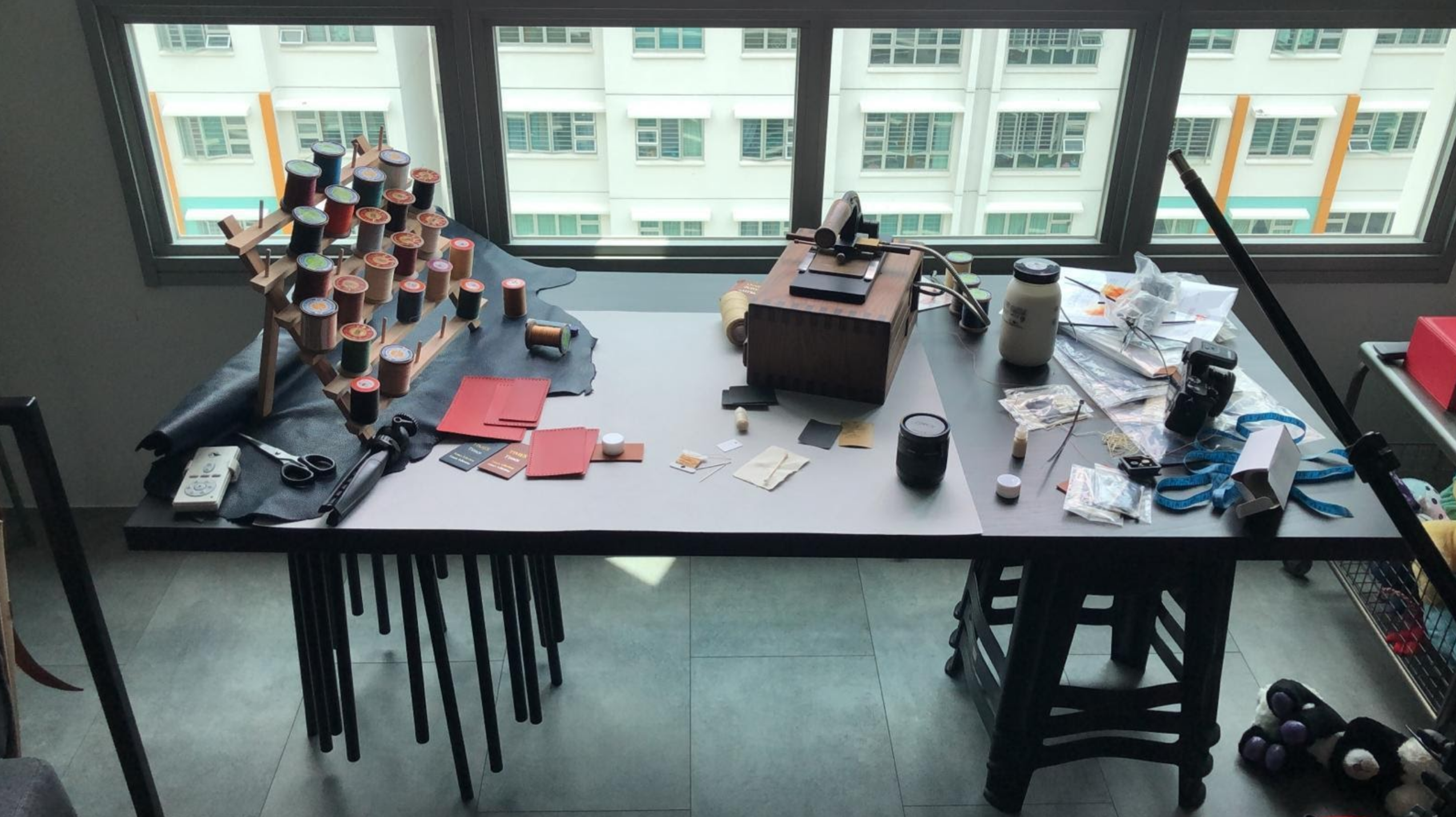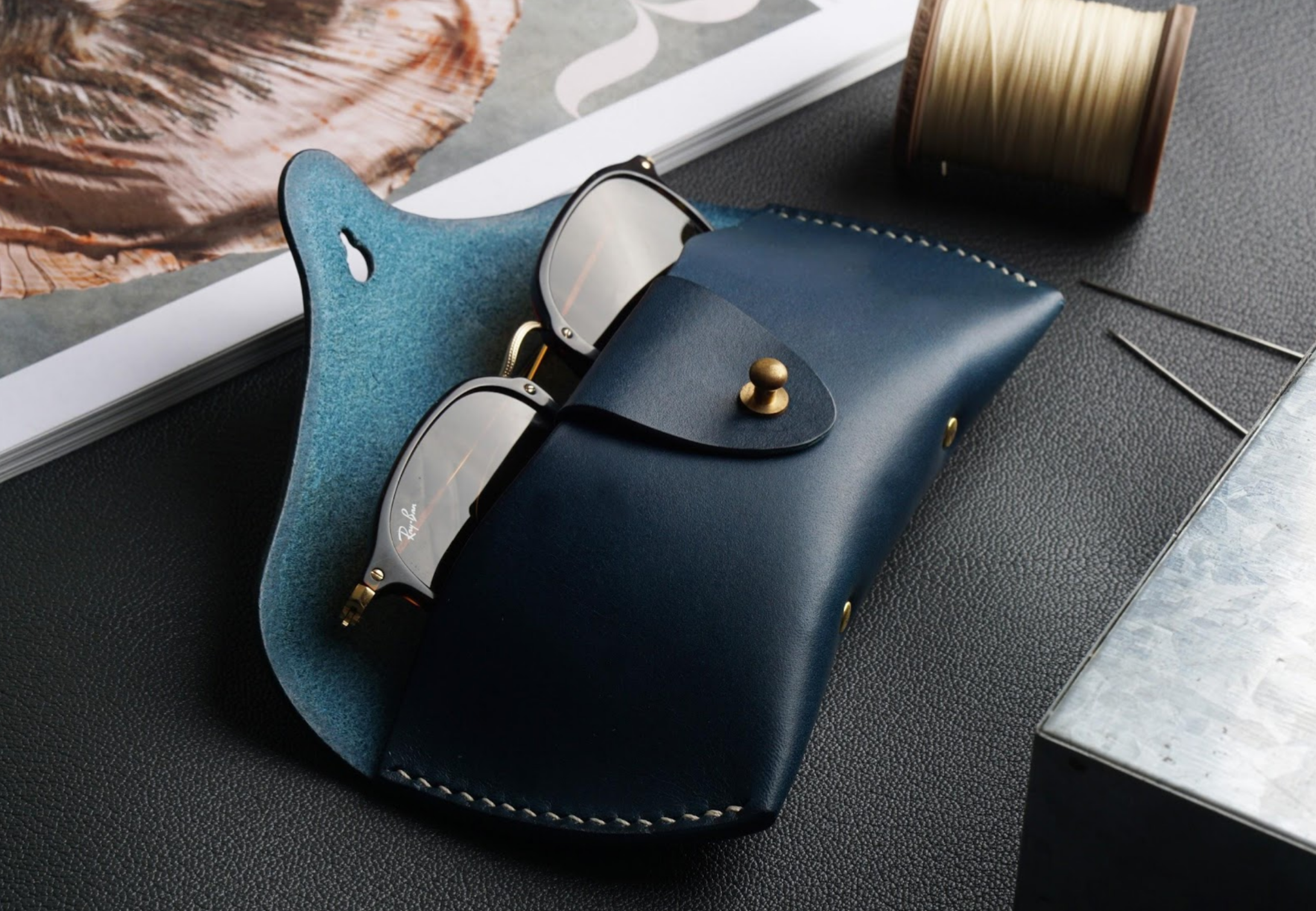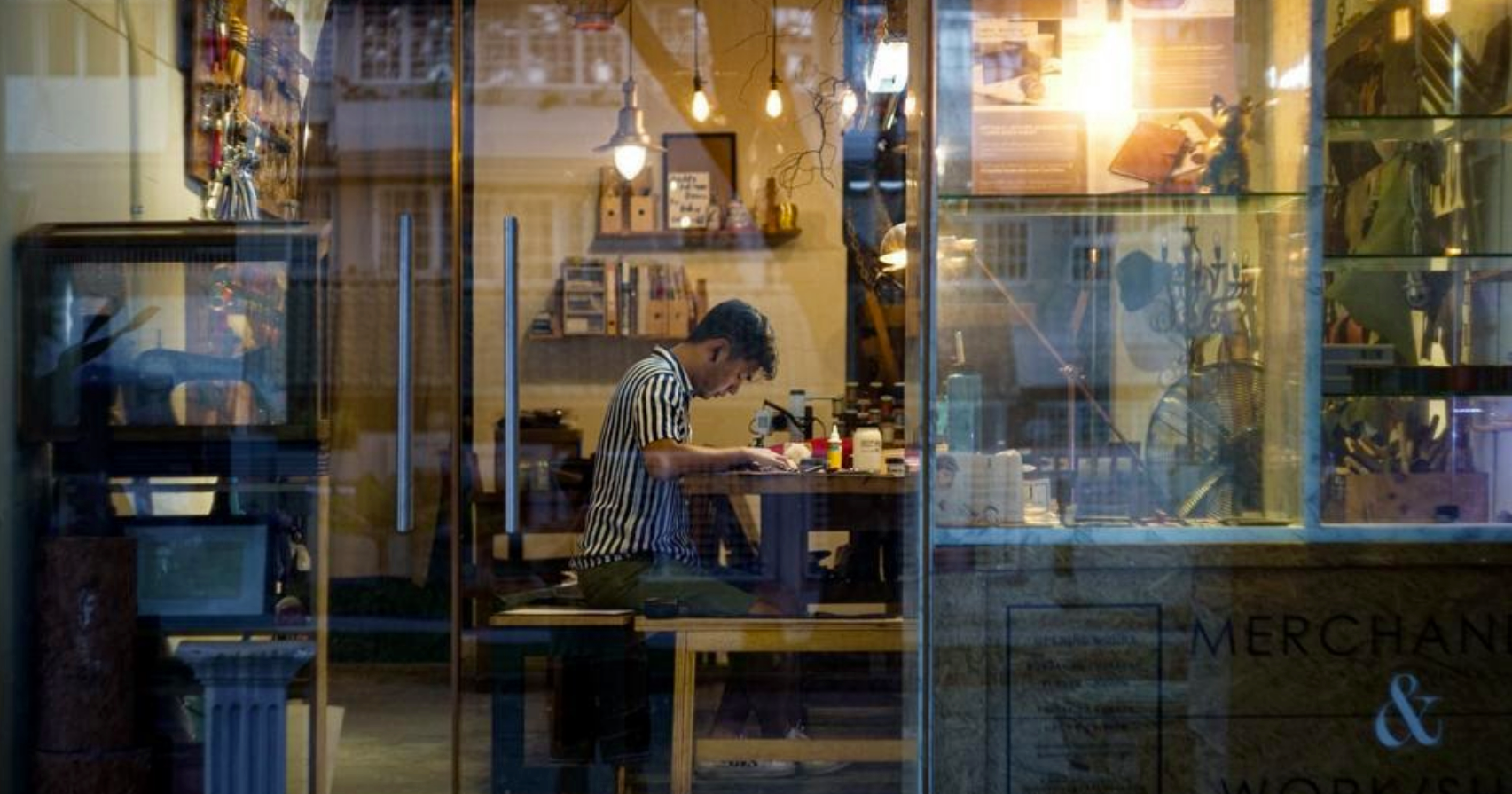By Glynis Ang and Ryan Tan
S$130,000.
That was how much J.Artisans, ran by Jeremiah and Christina See, was earning annually in its prime.
Throughout the leather craft company’s seven years of operations, the couple had worked with renowned brands like Netflix, Chanel, Mont Blanc, Dior, and even offered leatherworking courses to individuals and businesses.
From 2020, though, J.Artisans’ sales saw a steep decline. Faced with a pandemic-induced economic slump and a new-born to raise, Jeremiah was pushed to find other ways to make ends meet.
A business built up over seven years
J.Artisans used to occupy the first storey of a shophouse in Upper Serangoon. It’s leather craft workshops — popular among companies for team-building exercises — kept the store abuzz with activity over the years.
From 2012 to 2020, Jeremiah and Christina worked with over 80 companies and renowned brands, providing leather debossing and corporate gifts, which became the company’s main sources of revenue.
 HARD AT WORK: Before the pandemic, J.Artisans’ founder, Jeremiah See, would work for hours, perfecting handmade leather products for customers. As some would say, "You can’t rush art." PHOTO: JEREMIAH SEE
HARD AT WORK: Before the pandemic, J.Artisans’ founder, Jeremiah See, would work for hours, perfecting handmade leather products for customers. As some would say, "You can’t rush art." PHOTO: JEREMIAH SEE
Over the years, as their business bloomed, the couple expanded to the second floor unit of the shophouse, a commitment of $4,200 a month in rent in total.
It was a way for the couple to challenge themselves. “Once you commit to something right, you’ll be forced to work on it,” Christina said.
Things ran smoothly for a while, with Jeremiah being the handyman in the shop while Christina handled the business side of things. With a baby boy on the way, the couple was gearing up to balance running the business and raising their first born. But no one saw the global pandemic coming.
When Covid-19 struck
With a 100 per cent drop in sales due to the impact of Covid-19, Jeremiah found himself caught between a rock and a hard place. He had to continue paying rent and basic costs, all with minimal income and companies who had yet to pay him for his work.
On March 31, 2020, The Monetary Authority of Singapore (MAS), together with a group of finance industry associations, announced a package of measures to help ease the financial strain on individuals and SMEs brought on by the Covid-19 pandemic.
The package of financial measures would complement the initiatives in the Government’s Unity Budget and Resilience Budget to preserve jobs and support enterprises and households.
However, as Jeremiah would come to find out, J.Artisans did not meet the requirements of the schemes to receive the financial assistance they needed because of a small administrative issue. You see, Jeremiah was still technically registered as an employee at his aunt’s company.
Jeremiah had spent close to two years working at his aunt’s company, before starting J.Artisans. There, he managed operations, procured shipments, and oversaw part-time staff — all while studying for his degree in Business Administration at Kaplan.
The start of J.Artisans — which also came along in the midst of his studies — meant that he had to juggle working, studying, and trying to build his new enterprise. As his business grew, his schedule became even more hectic, but he never left his role at his aunt’s company, continuing to assist them on an ad-hoc basis whenever help was needed.
His documented employment was one of the reasons he was deemed ineligible for the financial assistance.
The couple sent in multiple applications for the Self-Employed Person Income Relief Scheme (SIRS), hoping to receive S$3,000 payouts in the months of May, July and October 2020. This would have given the couple more time to plan for their next step as the much needed payouts would have covered their expenses and shop rental.
Instead, they were offered four months worth of rental relief and a one-time S$500 discount. These definitely helped alleviate cost pressures, but it was far from sufficient.
The shop continued to bleed from January 2020 until the couple had to give up the shop in July 2020.
 J.Artisans was founded on a simple desk that Jeremiah worked on in his parents’ house back in 2012. Jeremiah has since given up the store and returned to where it all started, his humble home work station, this time, in his own house. PHOTO: JEREMIAH SEE
J.Artisans was founded on a simple desk that Jeremiah worked on in his parents’ house back in 2012. Jeremiah has since given up the store and returned to where it all started, his humble home work station, this time, in his own house. PHOTO: JEREMIAH SEE
J.Artisans was not the only shop forced to shut its doors during the coronavirus outbreak in Singapore.
In September last year, indie bookshop BooksActually was also forced to close shop after 15 years of business. However, the bookshop was able to move its business online, and even saw an improvement in sales.
Jeremiah also attempted to bring J.Artisans’s workshops online. Unfortunately, it did not work as well as it did for the bookstore.
J.Artisans introduced DIY kits for people to work on at home, in light of the movement restrictions in place for the most part of 2020. Alas, Jeremiah’s multiple attempts did nothing to push sales up.
As he puts it: “When you step into workshop you will feel the space.”
Evidently, the craft-making experience just wasn’t the same online.
 This spectacle case, made with vegetable-tanned leather, was one of the many products that could be made with their DIY kit. The kit was launched amid the Circuit Breaker movement restrictions in an attempt to draw in some revenue. PHOTO: CHRISTINA SEE
This spectacle case, made with vegetable-tanned leather, was one of the many products that could be made with their DIY kit. The kit was launched amid the Circuit Breaker movement restrictions in an attempt to draw in some revenue. PHOTO: CHRISTINA SEE
Jeremiah knew that his fate was in his own hands.
If the situation did not call for his hands to be working on leather, they were going to have to work on something else.
On the frontlines
To make ends meet, the leather craftsman took on a high-risk job of sanitising areas visited by people who tested positive for Covid-19. He would don a jumpsuit, respirator and a heavy tank for hours, along with other crew mates.
Jeremiah has since worked in and sanitised 30 to 40 different locations, most of which required multiple trips to fully sanitise the space.
“We were just thinking about money, how we are going to sustain everything. Of course we had some cash from the business but it's not going to last all the way without any big project.”
Aside from the physical labour, there was also the issue of safety.
As a precaution, he took extra steps to protect himself: Sanitising himself before entering his home and even keeping their dog, Dolce, in a separate room so it would come near him until he was thoroughly cleaned.
And while Jeremiah's wife, Christina, wanted to join him ("Because we would earn double the salary.”), she had to stay home to take care of their new baby boy.
It ended up providing only temporary relief, as sanitation jobs became increasingly popular over time. What originally started out as a four-man crew became a group with over 30 members.
“Once a job is posted on the group, within less than a minute, it would be fully filled up”, Jeremiah recounted. This made it almost impossible for him to secure shifts for himself.
Chasing a different sun
Jeremiah now hopes to start over.
He is looking to begin a new career in interior design with the help of an old friend who has become successful in the industry, and who has agreed to be his mentor. Today, he studies under the wing of the friend-turned-mentor, hoping to one day take on a project for himself and earn his next paycheck.
While he no longer has the studio, Jeremiah continues to do leather crafting at home on a much smaller scale — mainly at night and when orders come in.
For someone who has gone through the journey of losing a once-thriving business, Jeremiah shared that he has learnt a lot from the pandemic.
“I think I managed to move forward in a lot of things. If I have to give up something to gain something else. I’ll go ahead...We’re not doing very well so I had to do something. I cannot just keep going through with [the business].”
 The adorable smile of 10-month-old Jaden was what drove the couple to adapt and move on even after Covid-19 severely impacted their leather craft business. PHOTO: CHRISTINA SEE
The adorable smile of 10-month-old Jaden was what drove the couple to adapt and move on even after Covid-19 severely impacted their leather craft business. PHOTO: CHRISTINA SEE
Reflecting on the developments in 2020, Jeremiah wishes that he knew it was okay to accept things for the way they were when his business was at its lowest point.
“If it fails then it fails, nothing to be ashamed about, just keep carrying on.”
If you would like to order Jeremiah's leather craft, you can drop him an email at [email protected].
Stories of Us is a series about ordinary people in Singapore and the unique ways they’re living their lives. Be it breaking away from conventions, pursuing an atypical passion, or the struggles they are facing, these stories remind us both of our individual uniqueness and our collective humanity.
Top image courtesy of Jeremiah See. This piece was produced as part of Republic Polytechnic's media practicum module collaboration with Mothership.
If you like what you read, follow us on Facebook, Instagram, Twitter and Telegram to get the latest updates.
